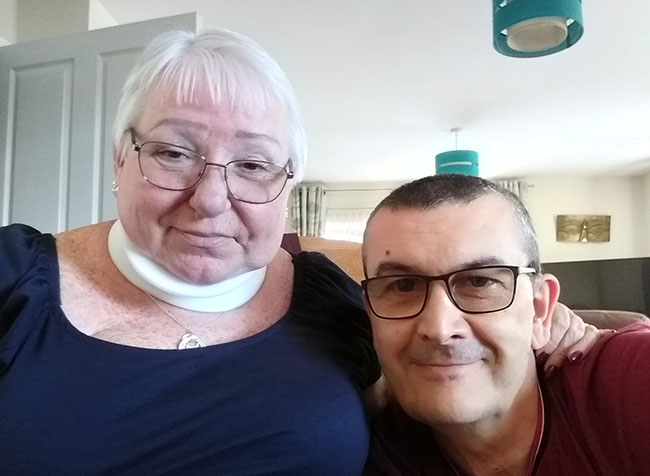 SCIENTISTS have made what they describe as a ‘Holy Grail’ discovery to protect nerves from damage and prevent disability in multiple sclerosis (MS).
SCIENTISTS have made what they describe as a ‘Holy Grail’ discovery to protect nerves from damage and prevent disability in multiple sclerosis (MS).
Remarkably, they’ve also discovered that a readily available diabetes drug (pioglitazone) could be a potential treatment.
In MS the protective coating that surrounds nerves, known as myelin, is damaged and nerves become less energy efficient as a result. Not having the energy they need makes nerves vulnerable to further damage and causes disability over time.
But for the first time researchers at the University of Edinburgh – funded in part by the MS Society – have discovered a natural mechanism in the body that tackles this issue, which they are calling ARMD (axonal response of mitochondria to demyelination).
Although this natural function alone doesn’t provide enough energy to address demyelination in MS, the discovery raises the possibility of using a drug to enhance it.
Further research in animal models now suggests pioglitazone – currently used to treat diabetes – could be the answer.
Dr Don Mahad, Lead Author and Senior Clinical Lecturer at the University of Edinburgh, said: “Although our understanding of MS has vastly improved over the last two decades, new therapies still do not protect nerve fibres. Such protection is the Holy Grail in MS treatment – not only for the relapsing form of MS, which has various options available, but for progressive forms too, where treatment continues to lag behind.
“Our discovery shows that nerves respond to myelin damage by increasing the movement of mitochondria (the cell powerhouse, which produces energy) to the area of damage – a response we’re calling ‘ARMD’.
“Remarkably, we were able to enhance ARMD and protect these vulnerable nerves using the readily available diabetes drug pioglitazone. This is an incredibly important discovery – one we believe could finally bridge the gap in MS treatment.”
Over the last few decades there have been huge strides made in our understanding of MS, and there are now over a dozen effective treatments for people with relapsing MS – but these only address damage that is caused by the immune system. In order to truly stop MS and find treatments for everyone, ways need to be found to both protect nerves from further injury and repair damaged myelin.
Last year, another MS Society funded study found that a different diabetes drug – the fasting mimetic drug metformin – was able to return cells to a more youthful state, and encourage the re-growth of myelin. Led by Professor Robin Franklin, the study found metformin could reverse changes that happen to cells responsible for making myelin as they age, and restore their regenerative capacity.
Dr Emma Gray, MS Society Assistant Director of Research, said: “This represents another important stride towards our goal of stopping MS – and we believe that MS treatment could in the near future look completely different.
“People with MS will be prescribed a combination of therapies that work on every aspect of the condition: stopping immune attacks and relapses, protecting nerves from damage, and regenerating lost myelin. It will mean no-one needs to worry about their MS getting worse.
“Currently, there are no effective neuroprotective therapies available for MS, but Dr Mahad’s research demonstrates we are getting closer – and finding treatments for everyone with MS is now a very real prospect.”
 ‘Stopping my disability progressing would be a miracle’
‘Stopping my disability progressing would be a miracle’
HUSBAND and wife Steve and Jacqueline Tutt both have MS. Steve, 56, has the relapsing form whereas Jacqueline, 62, developed secondary progressive MS after living with relapses for several years. The couple has two grown up children and live together in Eastbourne.
Steve said: “We used to be really outgoing, gregarious people, always out from Friday to Sunday, partying with our friends. Now we hardly see anyone. My wife is wheelchair bound and I struggle walking 20 yards unaided. You’re forced to stay inside.
“It’s hard that Jacquie doesn’t have any treatment to help her. In my case there’s all these DMTs (drugs that treat MS) you can take, but if you’ve got progressive MS there’s nothing for you. In the past we became very frustrated. We would read about new DMTs coming out for relapsing MS all the time but there was never anything for my wife.
“It sounds wrong but looking at my wife can be like looking into the future. If I get worse there will be nothing for either of us, and what do we do then? This research gives us something to look forward to and be excited about.”
Jacqui lives with symptoms like severe nerve pain and spasticity, where her joints go into spasms without any warning. She relies on a wheelchair to get around.
Jacqui said: “It breaks my heart not having treatment because I’m not the only person living with this – there are so many of us suffering. Right now I’m taking a cocktail of drugs to manage my pain but it doesn’t help really. I’m even on morphine but nothing works at all.
“Stopping my disability progressing would mean the world to me. It would mean I could live a life again and be there for the people that need me. It would be a miracle.”
About multiple sclerosis
- Over 130,000 people live with multiple sclerosis (MS) in the UK
- MS damages nerves in your body and makes it harder to do everyday things, like walk, talk, eat and think
- It’s relentless, painful, and disabling
- It’s unpredictable and different for everyone
- Helpline – 0808 800 8000
The research is published in Acta Neuropathologica

